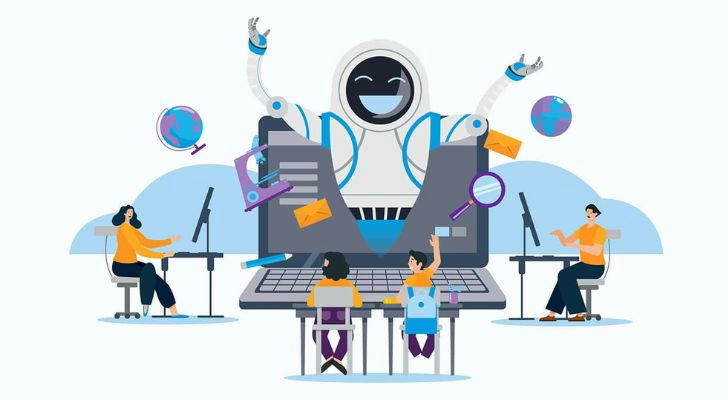AI Skills That Get You Hired – Learn Prompting, Tools, and Automation in 2025
AI is no longer just a buzzword—it’s becoming a core skill across industries. From digital marketing to logistics, healthcare, and finance, artificial intelligence is changing how businesses operate. If you're curious about how to adapt, reskill, or explore new job options, AI training programs offer a flexible and practical way to step into this growing field—no computer science degree required.
Why Learn AI in 2025?
Learning about AI is no longer limited to tech professionals. It’s a practical step for anyone working with data, automation, or modern digital tools. Here’s why it matters now more than ever:
- Widespread adoption: AI is being used in customer service, healthcare diagnostics, logistics planning, content creation, and fraud detection.
- Career flexibility: AI knowledge enhances roles in data analysis, project management, product development, and operations.
- Cross-industry value: Whether you work in retail, manufacturing, education, or media, understanding AI tools gives you an edge.
- Adaptability: With automation accelerating, employees who understand AI can better collaborate with these systems—not be replaced by them.
Most importantly, you don’t need to be a programmer or data scientist to get started. Many modern AI courses are designed for beginners and non-technical professionals.
What Do AI Training Programs Teach?
AI training programs vary in depth and focus, but most offer core modules that cover both theory and hands-on use. Here are the topics commonly included:
1. AI Fundamentals
Learn the basics of how AI works—machine learning, neural networks, decision trees, and natural language processing (NLP).
2. Tools & Platforms
Get introduced to widely used tools such as ChatGPT, TensorFlow, Google Cloud AI, Microsoft Azure AI, and IBM Watson. These tools are used for text generation, image recognition, chatbot creation, and more.
3. Data Handling
Understand how data is collected, cleaned, and structured for machine learning. You’ll explore basic statistics and how to interpret AI outputs.
4. Ethics & Privacy
Discuss the real-world impact of AI tools, including ethical concerns, bias in data, and compliance with privacy regulations.
5. AI Applications in the Workplace
Courses may include case studies or simulations showing how AI is applied in industries such as:
- Healthcare – diagnostics, virtual health assistants
- Retail – recommendation systems, inventory forecasting
- Marketing – AI copywriting, customer segmentation
- Finance – fraud detection, credit scoring
- Education – personalized learning platforms

Program Types: Which One Fits You?
There’s no one-size-fits-all when it comes to AI education. Depending on your background and goals, you can choose from the following formats:
1. Introductory Courses
These short programs (2–6 weeks) are ideal for beginners. They focus on understanding the core ideas behind AI and its common tools. Many platforms, like Coursera or edX, offer beginner tracks taught by university professors or industry leaders.
2. Professional Certificates
These are mid-level programs that combine theory with hands-on labs. They typically take 2–6 months to complete and often include a capstone project. Some examples include:
- AI For Everyone by Andrew Ng
- Microsoft Certified: Azure AI Fundamentals
- IBM Applied AI Professional Certificate
3. Career Bootcamps
Bootcamps are intensive, project-driven learning experiences that help you build a portfolio. They are best suited for individuals who want to move into roles such as AI analyst, machine learning assistant, or prompt engineer.
4. Workforce Development Initiatives
Some community colleges and workforce centers offer AI literacy training as part of broader tech upskilling programs. These often include career coaching and job placement assistance.
What Skills Can You Gain?
Completing a foundational AI course can help you build skills in areas such as:
- Understanding how AI fits into your current industry
- Writing effective prompts for AI tools
- Using data to guide automated decision-making
- Building simple machine learning models
- Communicating AI-related insights to team members
You’ll also gain familiarity with real tools being used today—skills that translate into both technical and non-technical job functions.
Who Should Consider AI Training?
AI skills are valuable to professionals at many stages:
- Office administrators learning how to use AI tools for productivity
- Marketers exploring automation and personalization
- Healthcare workers seeking to understand digital diagnostic systems
- Students and recent graduates preparing for emerging roles
- Project managers integrating AI tools into workflows
- Small business owners adopting AI-driven customer service
Whether you’re in a creative field, operations, or tech support, AI fluency is becoming an expected skill set.
Getting Started: What to Expect
| Step | Action |
|---|---|
| 1 | Choose a course that matches your level—beginner, intermediate, or advanced |
| 2 | Review time commitment (typically 2–10 hours per week) |
| 3 | Make sure the course includes hands-on practice or project work |
| 4 | Enroll, and commit to consistent weekly study |
| 5 | Apply what you learn in your current job or side projects |
Most programs provide a certificate of completion—a credential that can be shared with employers or added to your resume or LinkedIn profile.

Final Thoughts
Artificial intelligence is reshaping how we work, collaborate, and compete—and the best way to keep up is by learning how it works. AI training programs are now more accessible than ever, with flexible formats, beginner-friendly content, and practical tools that can be applied across industries.
If you're ready to future-proof your career, now is the time to explore an AI training program. One course could unlock your next opportunity in the digital economy.
